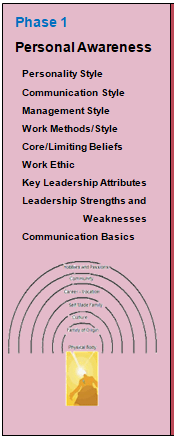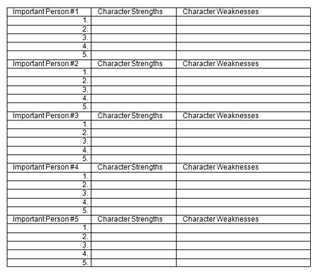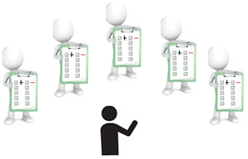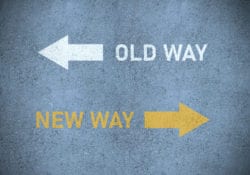Strong Point’s Leadership Rule #7: Use Your Mirrors. Know Your Impact
I’m not much of a camping person. In fact, I’m definitely more the princess and the pea type. Put me on the ground with a flimsy sleeping bag, some roaming and flying insects, nature’s elements like wind and rain and you’ll wake up to a human being that acts more like the local grizzly bear raging through the woods, than Sharon the steadfast Business Architect. My bones ache when I camp. My eyes and sinuses swell shut, and I begin to smell worse than the moss on the nearby tree. I know this (as do my friends and family) because I absolutely love nature and I persist with all of these deterrents, to be “out in it.”
The one thing I notice more about camping though, than anything else, is how lost I feel without a mirror. I mean, I want to see myself in the morning. Not just to see if there’s a twig or bug twisted in my straw-like hair, or to see if last night’s beans and spinach are lodged in the gaps of my receding gums, but more to just “check in” with myself.
I’m pretty sure; I’m not the only one who feels this way. This looking in the mirror self-assessment connects my observer self with my active self and asks daily questions like “Are you Okay? or “Do you know what you have to do today?”, and “Are you ready for it?!” “Can you calm and regulate yourself enough to make the most of the day?” Camping or not, I work hard to start my day “with myself” checking in. A mirror is a perfect tool to do that. You can look into your own eyes and see the tiredness or gratitude, worry or satisfaction looking back at you. For a minute, you can literally check yourself and get a glimpse of what others see when they look at you. Without a mirror, it’s harder to do that. Without a mirror, the self-assessment occurs on a deeper level and the questions come more from the soul center than the mind. Sometimes the lack of a mirror even changes the daily question from “How am I?” to “Who am I?” The point is, mirrors are a tool that can be used for self-assessment.
Self-Knowledge and Self-Reflection are two mission-critical Leadership Skills. If you consider your body your core engine and communication vehicle, then self-knowledge helps to optimize your engine, and self-reflection makes you perform the regular pit-stops, evaluations and upgrades necessary to literally keep your engine running.
It still brings me to a dead stop sometimes, to realize that not everyone views their body like a precious vehicle to creatively and uniquely manifest reality. Most people, in my opinion, treat their bodies, minds, and spirits the way they would a stolen get-away car. They “jump in,” start driving, and careen from one destination to another without full knowledge of their direction, the capabilities of their vehicle or a deeper sense of how they could advance their core engine to drive to new heights.
Socrates says, as he did in Phaedrus, that people make themselves appear ridiculous when they are trying to know obscure things before they know themselves. Plato also alluded to the fact that understanding ‘thyself,’ would have a greater yielded factor of understanding the nature of a human being.

Strong Point’s Leadership Methodology: Phase 1, is all about Self Awareness. This phase of the Leadership Program, when it’s implemented, seeks to provide the professionals in the cohort, a basic understanding of their own being.
Can you, right now, spout off your Myers Briggs personality type? What about your DISC Profile?; Your preferred Communication and Learning Style?; and your Management and Leadership Style? Can you name the five most common Leadership Styles? (hint: they are Laissez-Faire, Autocratic, Participative, Transactional, Transformational) and which one or two you gravitate toward? What about your Top Five Core Values and Limiting Beliefs? Don’t know them? Can you articulate them to a colleague? Can you identify how companies and psychologists think about and categorize Work Methods? What are those? and where do you fit into those methods? What Values do you apply in Action and what Values do you possess that are most noticeable to others? Can you name your most appealing and most annoying speaking and verbal ticks? How about Belbin Team Roles. Have you heard of those? and do you know which kind of team player you are? Are you more of a persuader, or a builder, a thinker or an organizer? Do you have your Top 5 2018 Goals written down and in your wallet? What about a Five Year Plan? What’s your own success rate for realizing your goals? Are your goals too unrealistic? or do they indicate you’re not stretching far enough?
These are the basic things you should know about your own being and its operability. You are your own vehicle and maintaining an objective view of your own self, is the very foundation of Effective Leadership. You cannot lead others unless you’re very capable of leading yourself. You can’t lead your thoughts, and actions and emotions unless you know and study them and can predict their arrival and impact on you, as you literally work through them, while you work through life.
Self Mastery is the essential foundation of Strong Leadership. Self Mastery requires deep study. It’s vitally important to know yourself well. You use the body you call home to most effectively relate to and interact with others and get things done. Thus the second part of Rule #7: Use Your Mirrors. Know Your Impact. Logic follows that if you don’t know your core Learning and Communication Styles, as an example, then it’s unlikely you’re aware of how others learn from you, or how others receive the messages you are intending to send. Any one of us can conjure up a million stories of colleagues and co-workers detailing the wonder, the weirdness or the willful denial of unexpected or unintended outcomes as the result of a well-intentioned discussion or deed. Being able to effectively predict another’s reaction to your words and actions requires the kind of tenacious repetition and study of human behavior (yours and others), you can liken only to Thomas Edison’s one thousand tries to discover the light bulb or Babe Ruth’s 1,330 strike-outs required to hit his 714 home runs. There’s a lot failure related to learning human behavior. There’s a lot of loss, too, associated with self-awareness. Emperor’s clothes or not; looking in the mirror regularly, provides a lot of opportunity to see your own shadow. This is entirely the point. Leaders make self-study a discipline.
It’s not enough to have one mirror. You have to have many mirrors, and angles of self-reflection to create a sane and realistic vision of yourself. The way others see you, is as important to your Leadership Capability, as how you see yourself. You cannot get a sense of wholeness or completeness of capability about yourself without meaningful input from others. There’s an exercise, I like to conduct in Phase 1 of Strong Point’s Leadership Program called the “Top 5” and it’s a simple exercise. Take the five most important and influential people in your life, good AND bad and list their top character strengths and weaknesses. Rattle them off the top of your head. Think IMPACT. Name only those people who have had a lifelong impact on how you think, feel and act.


Next, review the comprehensive character traits on the entire list, and highlight the common traits on either side of the equation, strengths and weaknesses. You guessed it. You’ve just highlighted YOUR core strengths and weaknesses. These are your five “outside looking in” mirrors that provide a fuller view of who you are at this moment in time. You should not be surprised by this image or the character strengths and weaknesses reflected back to you. You’re not the only one seeing this mirror image. Everyone else see it too. Leaders know themselves. They also have a consciousness about how others see and know them. They work toward a “congruence of character,” that closes the gap between how they see themselves and how others see them. This “Top 5” assessment is a simple test to regularly test your self-knowledge. It should not be conducted as a “one and done” exercise. It should become a regular review and part of a disciplined self-assessment and “check-in.”
Two of my favorite books The Dark Side of the Light Chasers by Debbie Ford and Romancing the Shadow by Connie Zweig Ph.D. and Steve Wolf Ph.D. worked wonders in my own self-study for how to integrate, use or heal those parts of myself that I really hated to see. If you’re not thoughtful about your own self-image and don’t regularly reflect on your developing Leadership Character, then your weaknesses and your shadow-self will begin to express latent resentments, reveal unspoken truths, inhibit your unrealized potential and manifest into real conflicts at work. Unknown parts of yourself will slow, stall or stop your efforts toward advancing Leadership Capability. These books are still in my Leadership Library and I parse through them sometimes, as a reminder to stay real.
When CEOs speak with Rob Kaplan looking for answers, he explains his view of Leadership this way: “Leadership is not about having all the answers. “ He’s been recorded saying:
“Show me a company, nonprofit, or a government leader that is struggling, and almost invariably you’ll see someone who isn’t sufficiently focused on asking the right questions,” says Kaplan. “Most leaders spend a lot of their time looking for answers. Very often, they may feel isolated and alone. “
This is THE Robert S. Kaplan speaking. The Senior Fellow and Marvin Bower Professor of Leadership Development, Emeritus at the Harvard Business School. He’s the co-developer of both activity-based costing (ABC) and the Balanced Scorecard (BSC).
In his book, What to Ask the Person in the Mirror, Kaplan also talks about self-awareness and using others as mirrors for self-reflection. These following quotes from his book remind me and us to continually check our mirrors.
“Most good leaders understand they need to coach key employees, but fewer realize the importance of asking subordinates for coaching. The more senior you are in a company, the fewer senior executives and peers are able to effectively observe and coach you. Kaplan gives advice on several techniques that leaders can use to solicit coaching from their direct reports. “Ironically, the executives most in need of feedback in many organizations are very senior,” he says. “They may have become isolated or not realize that their direct reports have constructive advice regarding specific changes they need to make to improve their leadership effectiveness.”
I honestly believe that if you use your mirrors and know your impact, you are more comfortable asking your team or your “Top 5” professional colleagues to provide the realistic reflection and feedback you need to continually exercise and advance your and their leadership capability.
I also believe Leadership Capability is best advanced through a Leadership Development Program, executed in a Team Environment, using a Skill Studio or a Skill Lab as a place and forum to identify, enhance and improve the Leadership skills of your organization. If we want to avoid having a “false image” of ourselves and work toward authenticity, we have to do it together in a room full of mirrors and have the courage to face ourselves and others. Practiced Self-Knowledge improves Leadership Capability and Impact.




